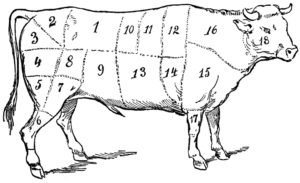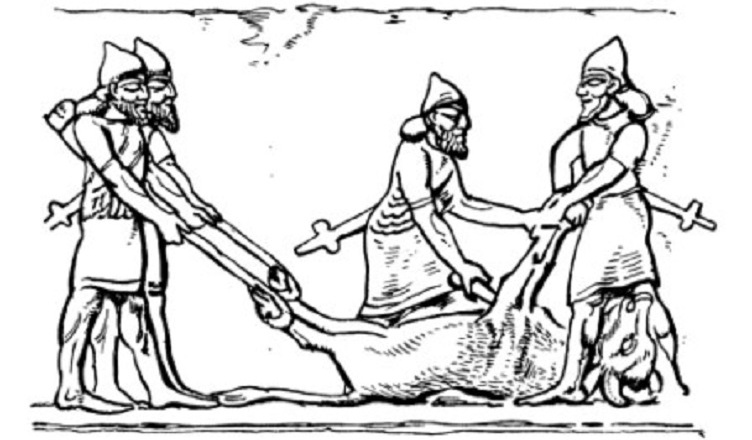From Leviticus 1-4
 The Levitical priests were trained butchers. They cut up animals. Blood poured and went everywhere. Cutting up and burning animals was part of Jewish life. Cutting up and burning animals was part of Jewish worship of God for more than a thousand years before Jesus was born.
The Levitical priests were trained butchers. They cut up animals. Blood poured and went everywhere. Cutting up and burning animals was part of Jewish life. Cutting up and burning animals was part of Jewish worship of God for more than a thousand years before Jesus was born.
This post is part of my bible in a year series.
Passage and Comments
In today’s chapter we start off the book of Leviticus and look at the instructions for the burnt offering.
1 The LORD called Moses and spoke to him from the tent of meeting, saying, 2 “Speak to the people of Israel and say to them, When any one of you brings an offering to the LORD, you shall bring your offering of livestock from the herd or from the flock. (Lev 1.1-2)
‘Offering to the LORD’. Ancient sacrifices were thought of as ‘offerings’ and ‘gifts’ given to God. When they performed sacrifices, ancient Israelites gave to God some of what they believed God had given them, expressing their close relationship with God and seeking to deepen that bond.
‘From the herd of the flock’. The offering must cost the person. They could not use any animal as a sacrifice. It must be from their own flock.
3 “If his offering is a burnt offering from the herd, he shall offer a male without blemish. He shall bring it to the entrance of the tent of meeting, that he may be accepted before the LORD.
4 He shall lay his hand on the head of the burnt offering, and it shall be accepted for him to make atonement for him.
5 Then he shall kill the bull before the LORD, and Aaron’s sons the priests shall bring the blood and throw the blood against the sides of the altar that is at the entrance of the tent of meeting. 6 Then he shall flay the burnt offering and cut it into pieces, 7 and the sons of Aaron the priest shall put fire on the altar and arrange wood on the fire. 8 And Aaron’s sons the priests shall arrange the pieces, the head, and the fat, on the wood that is on the fire on the altar; 9 but its entrails and its legs he shall wash with water. And the priest shall burn all of it on the altar, as a burnt offering, a food offering with a pleasing aroma to the LORD. (Lev 1.3-9)
‘Lay his hand on the head’. Leaning/laying one hand on the head of an animal identified the offerer as its owner, who was transferring the victim to God and who would in turn receive the benefit of that sacrifice.
‘Accepted for him to make atonement’. Many sacrifices function to atone for sin. They make expiation for sin. Like the expiation fine for a parking violation. The simplest view of expiation is that the sacrifice is a gift is intended to gain favor from God.
10 “If his gift for a burnt offering is from the flock, from the sheep or goats, he shall bring a male without blemish, 11 and he shall kill it on the north side of the altar before the LORD, and Aaron’s sons the priests shall throw its blood against the sides of the altar. 12 And he shall cut it into pieces, with its head and its fat, and the priest shall arrange them on the wood that is on the fire on the altar, 13 but the entrails and the legs he shall wash with water. And the priest shall offer all of it and burn it on the altar; it is a burnt offering, a food offering with a pleasing aroma to the LORD. (Lev 1.10-13)
‘Bull’, ‘Sheep or goats’, ‘Bird’. Different option for burnt offerings are given so that people of low income could also make the sacrifice.
14 “If his offering to the LORD is a burnt offering of birds, then he shall bring his offering of turtledoves or pigeons. 15 And the priest shall bring it to the altar and wring off its head and burn it on the altar. Its blood shall be drained out on the side of the altar. 16 He shall remove its crop with its contents and cast it beside the altar on the east side, in the place for ashes. 17 He shall tear it open by its wings, but shall not sever it completely. And the priest shall burn it on the altar, on the wood that is on the fire. It is a burnt offering, a food offering with a pleasing aroma to the LORD. (Lev 1.14-17)
‘Pleasing aroma’. Given with the right attitude. These offerings brought the LORD pleasure. They were a means by which the people could worship the LORD.
Story of Israel

In the Hebrew Bible, sacrificial death always involves transformation. One of the most common ways to transform something is to destroy it. Destruction removes the animal from the ordinary realm and transfers it to a transcendent one. God received the smoke of the burning sacrifice as a ‘pleasing aroma’ (cf. Lev 1:13). In so doing, God enjoyed a fellowship meal with human beings in God’s dwelling on earth—the temple.
When living animals and people are killed, they leave one realm of existence and enter another. Killing a sacrifice, devoting something to destruction is the means of giving to God. These sacrifices please Him and are used to purchase people from slavery.
Story of Jesus
In scripture death and destruction are not always seen as a form of punishment. This also applies to Jesus’ blood spilling and death on the cross. In a number of allusions to Jesus’ death on the cross, God is portrayed giving up Jesus as a sacrificial gift, a ransom and a payment. These words suggest a transaction is being made.We also see this in the gospel.
45 For even the Son of Man came not to be served but to serve, and to give his life as a ransom for many.” (Mk 10.45)
In the gospel, Jesus gives himself up as an offering for our sins and as a ransom payment to purchase us for God. Thank you Lord Jesus.
Copyright © Joshua Washington and thescripturesays, 2014. All Rights Reserved.

